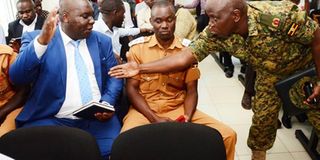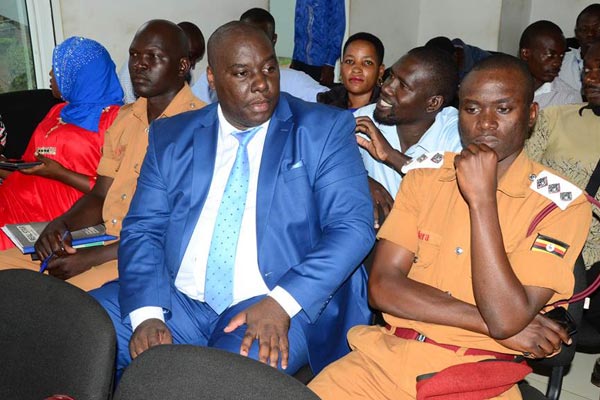Why High Court allowed army to try Nakawa MP

Nakawa MP Michael Kabaziguruka (left) greets the UPDF lead prosecutor, Maj George Kalemera, during the court session yesterday. Photo Michael Kakumirizi
What you need to know:
Judge Patricia Wasswa Basaza ruled that Mr Kabaziguruka is subject to military law and should be tried there for offences relating to security and treachery.
Kampala. Nakawa MP Michael Kabaziguruka yesterday
where his former party leader Kizza Besigye succeeded in getting his trial in the Military Court Martial stopped on the grounds that he is a civilian who should be tried in the civil courts and not the military one. Mr Kabaziguruka’s lawyers, however, said they will appeal the ruling by Justice Patricia Wasswa Basaza.
Mr Kabaziguruka was
shortly after the February 2016 elections, having defeated then Attorney General Freddie Ruhindi in the Nakawa MP race. Shortly after his arrest, President Museveni claimed that Mr Kabaziguruka attempted to assassinate him at his farm, claims Mr Kabaziguruka denied in a phone interview before he was removed from house arrest, charged in the General Military Court Martial (GCM) and remanded to Kigo prison in June.
The MP protests his trial by the military court, which he told the High Court, will not exercise justice in his case because the President, who is also the Commander in Chief of the Armed Forces and appoints the chairman of the GCM, has publicly showed himself to be the complainant against him. He also challenges the jurisdiction of the GCM in his case, arguing that being a civilian himself, he should be tried in the civil courts.
Civilians petitioning against being tried in the military has been a fairly common occurrence in recent years, with Dr Besigye’s challenge against his trial by the military being the most prominent case. Dr Besigye, upon arrest in 2005, was charged with treason, misprision of treason, rape and illegal possession of firearms, some of which offences were brought against him in the military court.
Amid protests and defiance by Gen Elly Tumwine, then chairman of GCM, the High Court ruled to stay the trial in the military court upon Dr Besigye petitioning it, and the Constitutional Court eventually stopped it altogether.
Mr Ladislaus Rwakafuzi, one of the lawyers representing Mr Kabaziguruka, notes a “slight” difference between Dr Besigye’s case and Mr Kabaziguruka’s.
“With Besigye, it was a case of charging someone with civil offences in the military court,” Mr Rwakafuzi says. Treason, which Dr Besigye was charged with, is a civil offence handled by the police and triable in civil courts, Mr Rwakafuzi says, a fact the Constitutional Court pointed out.
In Mr Kabaziguruka’s case, Mr Rwakafuzi says, “he was charged with military offences (triable by the GCM) but the particulars of the offences are civil and have nothing to do with the military court.”
The charges against Mr Kabaziguruka, brought under different sections of the UPDF Act, are in two counts.
Count one: “Between the months of February and June 2016, in diverse places in Wakiso, Kampala and Luweero districts of Uganda, with intent to prejudice the security of the Defence Forces or Forces cooperating with the Defence Forces, did contrive a plot to overthrow the Government of Uganda by force of arms.”
Count two: “Between the months of February and June 2016, in diverse places in Wakiso, Kampala and Luweero districts in Uganda, with intent to prejudice the security or interests of the Republic of Uganda, did commit acts of treachery to wit; infiltrate the Defence Forces and engage themselves in war-like activities against the Government of Uganda.”
Mr Rwakafuzi argues that these particulars amount to treason, and that therefore his client should be tried in the High Court and not the GCM.
Justice Basaza disagreed, however disagreed with him saying: “…the GCM has jurisdiction to try civilians such as the applicant for offences under the UPDF Act, 2005, or any other Act and that the applicant is subject to military law,” the ruling reads in part.
Ms Basaza based her ruling on sections 119 (i) (g) and 197 of the UPDF Act of 2005. According to section 119 (g) of the UPDF Act, the GCM can try “Every person, not otherwise subject to military law, who aids or abets a person subject to military law in commission of service offense.”
The main point the judge raises in maintaining that Mr Kabaziguruka should be tried in the military court, therefore, is that he is accused of helping soldiers, with whom he is jointly accused, in committing “service offences” in the military.
Court case
Prosecution at the General Court Martial says Kabaziguruka and others intended to prejudice the security of Defence forces.
The offences were allegedly committed between February and June this year in districts of Kampala,Wakiso and Luweero.
However Kabaziguruka and his lawyer Ladislaus Rwakafuuzi said they would appeal against the ruling because the judge did not understand their arguments.
The MP has been returned to Kigo prison until the September 26 when he will re-appear before the General Court Martial.






